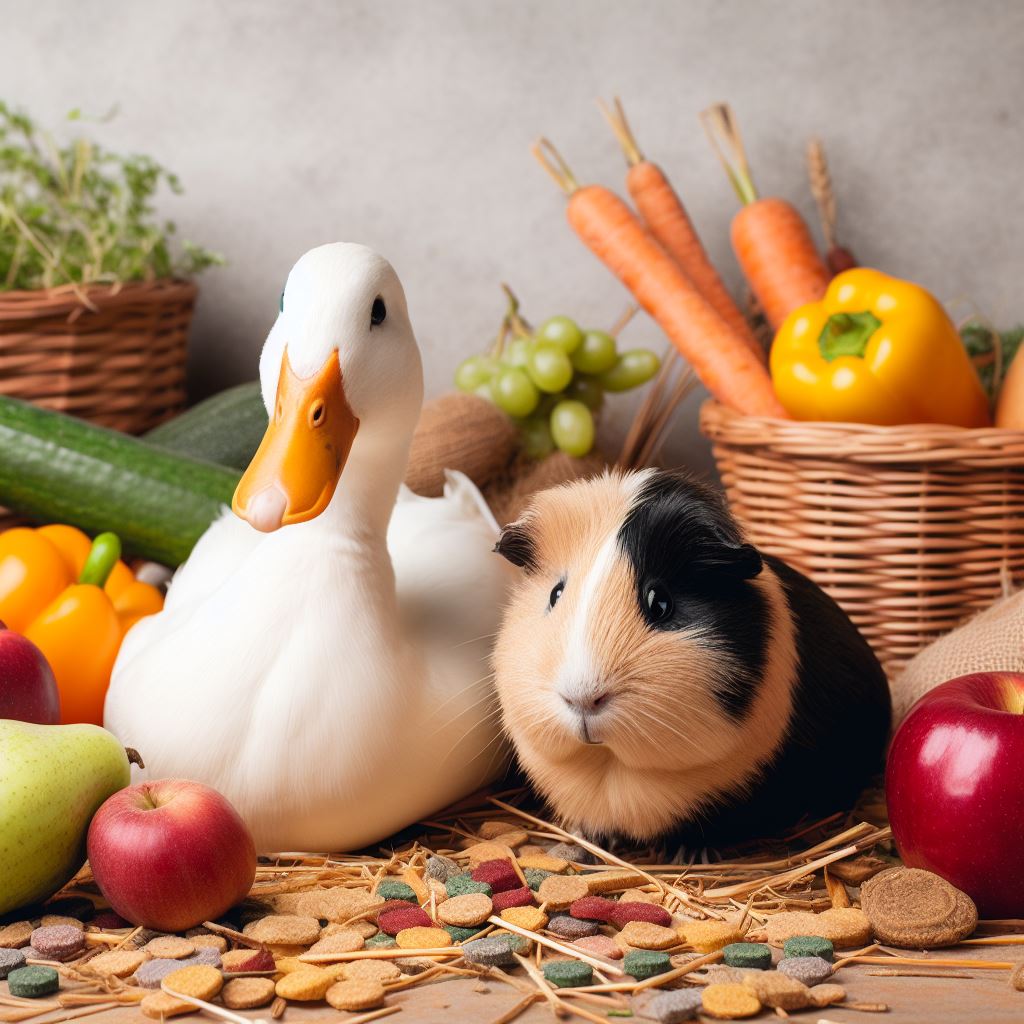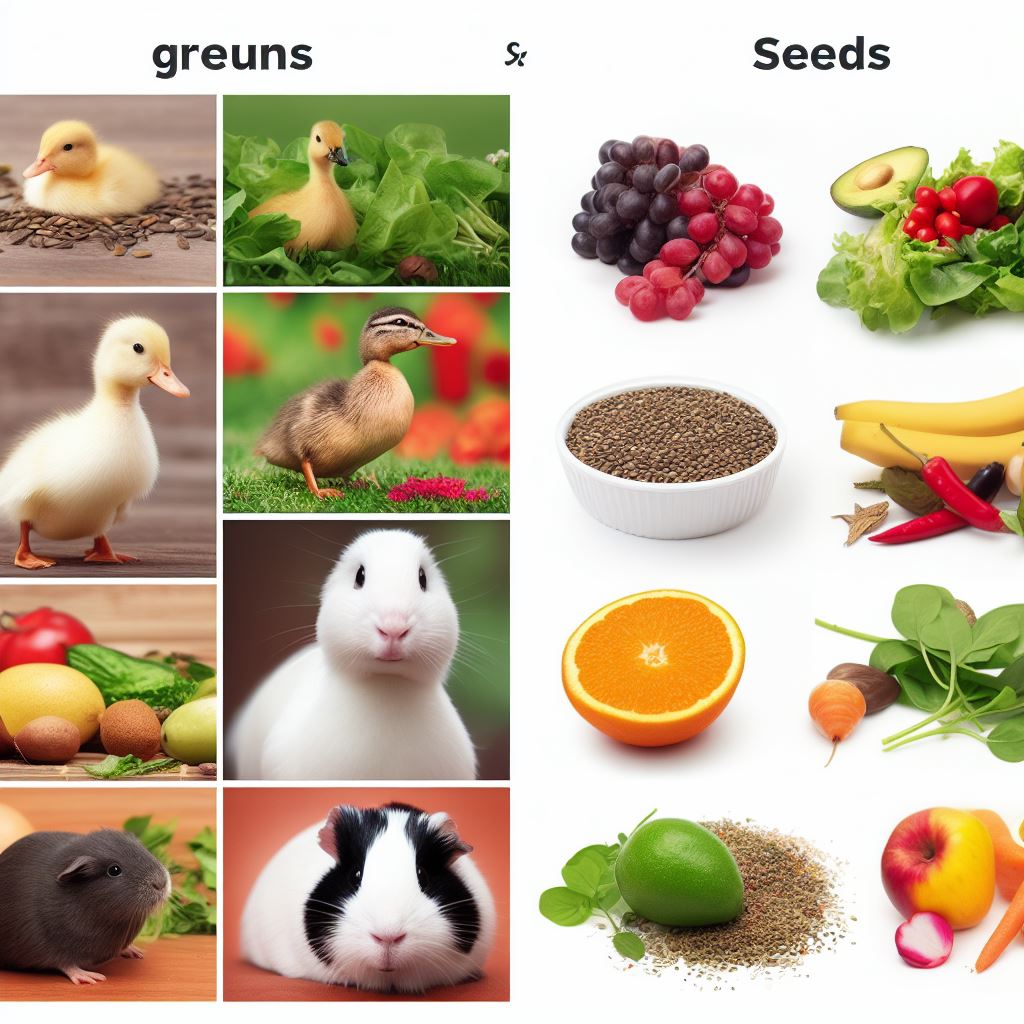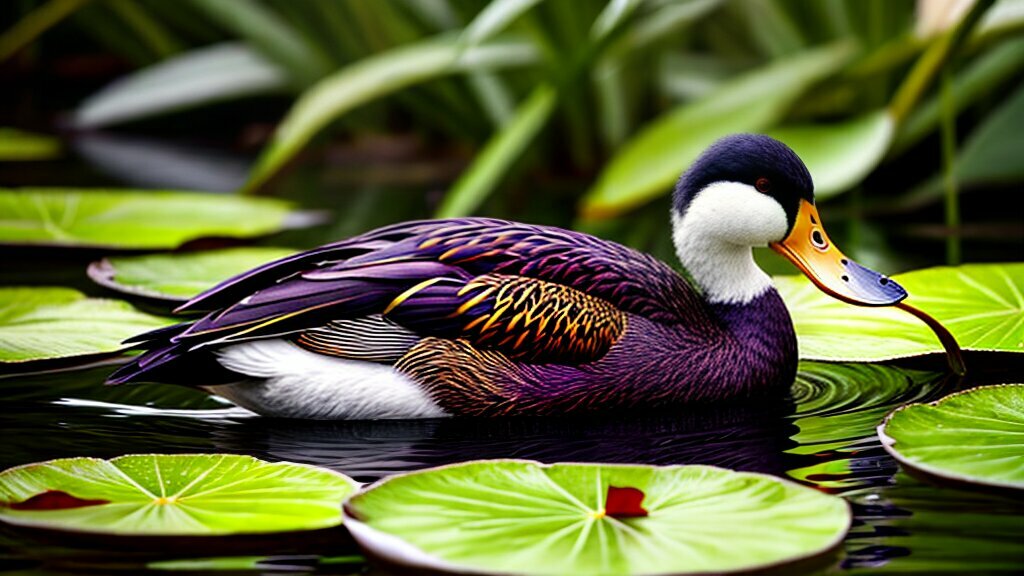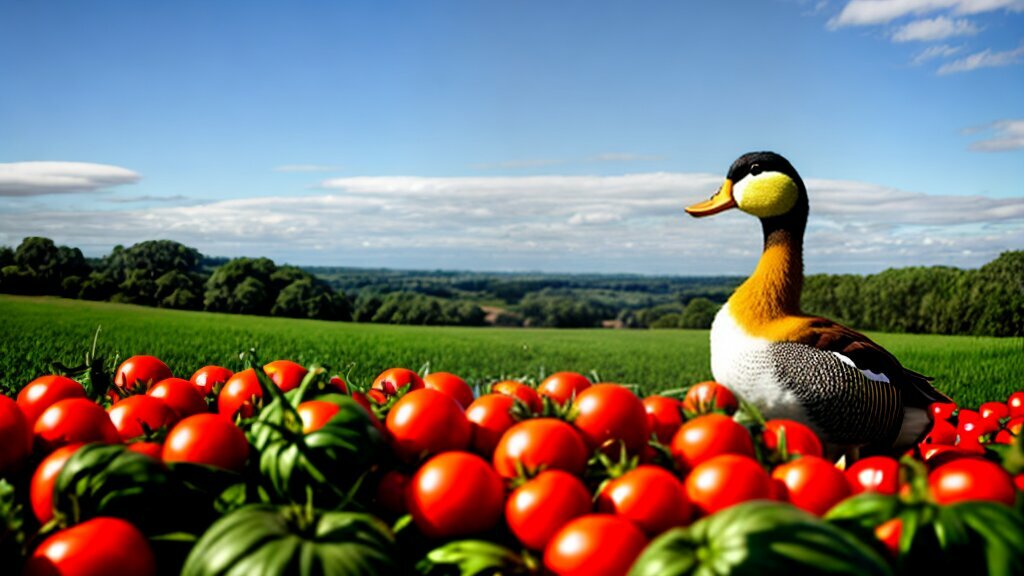Can Ducks Eat Guinea Pig Food? Dietary Needs Comparison

Table of content:
Can Ducks Eat Guinea Pig Food? Ducks and guinea pigs may seem like similar small pets, but when it comes to their dietary needs, they are quite different. Ducks are omnivorous waterfowl, while guinea pigs are herbivorous rodents.
This means their nutritional requirements do not fully align. Guinea pig food is specially formulated to the needs of cavies, containing added nutrients like vitamin C, calcium, and phosphorus that are not as necessary for domestic ducks.
Key Takeaways:
- Ducks can eat some types of guinea pig food in moderation, but it should not be their primary diet.
- Greens, fruits, vegetables, seeds and commercial duck feed are more suitable as the bulk of a duck’s diet.
- Guinea pig food often contains added vitamin C, calcium, and phosphorus that domestic ducks do not need in high amounts.
- Some guinea pig pellets and mixes contain processed corn, soy, or fish products that can upset a duck’s digestive system.
- Ducks have different nutritional needs than guinea pigs due to their status as waterfowl omnivores.
However, in moderation, some commercial guinea pig foods can occasionally be offered as a supplemental treat for pet ducks. This includes fresh greens, limited fruits and vegetables, and certain guinea pig pellets and mixes.
Guinea pig food should never comprise the bulk of a duck’s diet though, as the nutritional balance is not quite right for their needs as waterfowl.
 What Do Ducks Eat?
What Do Ducks Eat?
To understand if guinea pig food is suitable for ducks, it helps to first know what makes up a proper duck diet. In the wild, ducks are omnivores foraging on a wide variety of foods, including:
- Greens – ducks eat leafy greens including lettuces, sprouts, spinach, kale, swiss chard, celery, and fresh grasses. These provide nutrients like vitamin A, vitamin K, and calcium.
- Seeds – wild ducks eat seeds from grasses, flowers, fruits, and aquatic plants. These provide protein, healthy fats, and fiber.
- Fruits – berries, melons, apples, grapes, and other fruits are eagerly eaten by wild ducks when available. They provide natural sugars, vitamin C and antioxidants.
- Insects – ducks consume larvae, insects, worms, slugs, and other invertebrates, which offer protein.
- Fish & Amphibians – some wild ducks eat small fish, frogs, tadpoles or crustaceans for protein.
- Grains – ducks will graze on grains and cereals like wheat, rice, corn, oats or barley as an energy source.
When kept as pets, domestic ducks have similar dietary needs. A balanced commercial duck feed provides a lot of what they require in captivity. Their diet can be further supplemented with fresh greens, limited fruits/veggies, and occasional treats like mealworms. Access to a small pond or pool for foraging aquatic plants and insects is also beneficial.
Guinea Pig Nutritional Needs
Now let’s look at what guinea pigs require in their diet. Guinea pigs are herbivores that eat a diet high in the following:
- Hay – the bulk of a guinea pig’s diet should be fresh timothy or orchard grass hay, which provides fiber and nutrients.
- Vitamin C – unlike most mammals, guinea pigs cannot produce their own vitamin C and need a daily dietary source from fruits/veggies high in this nutrient.
- Calcium – for strong bones and teeth, guinea pigs need a steady calcium intake, met through feeding alfalfa hay and certain veggies.
- Low Fat/Protein – guinea pigs are sensitive to excess fat and protein in their diet, which can cause obesity and other health issues.
Commercial guinea pig foods like pellets and mixes try to mirror these needs in a blend of concentrated hay, fruits/veggies, and vitamin supplements. This specialized formula accounts for their unique needs as herbivorous rodents.
Can Ducks Eat Guinea Pig Pellets?
Guinea pig pellets are among the most common commercial feeds marketed for cavies. The pellets contain concentrated sources of fiber, vitamins, and minerals guinea pigs require. However, for ducks, these pellets can be fed only in moderation as periodic treats, not daily diet staples.
Some pros of ducks eating guinea pig pellets include:
- Pellets provide nutrients like vitamin C, calcium, and phosphorus ducks need in moderation.
- They are high in fiber and low in fat, which is healthy for ducks.
- Pellet formulas are designed to be highly digestible for small herbivores like guinea pigs.
Some cons and precautions to keep in mind are:
- Pellets do not contain the right balance of protein, fat, and carbohydrates suited for ducks long-term.
- Added vitamin C and calcium levels are too high for continuous duck feeding.
- Some pellets contain fish meal or processed soy/corn unsuitable for waterfowl.
- The concentrated formula can be too rich if fed as a mainstay duck diet.
For these reasons, a few guinea pig pellets can be offered to ducks as occasional treats, but should never exceed 10% of their total diet. The bulk of a duck’s nutritional needs should still come from duck feed and fresh produce. Read pellet ingredients carefully and avoid formulas with processed corn, fish, or soy.
| Food Type | Pros for Ducks | Cons for Ducks |
|---|---|---|
| Guinea Pig Pellets | High in vitamin C, calcium and fiber. Low fat. Digestible. | Excessive vitamin C, calcium. Low protein/fat ratios. May contain corn, soy, fish. |
| Duck Feed | Balances proteins, fats, and carbs for waterfowl. Vitamins/minerals tuned to ducks’ needs. | Can lack vitamin C and calcium provided by some pellets. |
| Greens/Produce | Fresh foods provide hydration and nutrients essential to ducks. | Must be fed a diverse diet to meet nutritional requirements. |
Can Ducks Have Guinea Pig Food Mixes?
Another common guinea pig feed is food mixes containing assortments of dried fruits, veggies, seeds, grains and vitamin supplements. These can be offered to ducks in moderation also, keeping in mind the pros, cons and precautions.
Benefits of guinea pig mixes for ducks can include:
- Dried fruits and veggies provide a source of vitamins, notably vitamin C.
- Seeds offer key proteins and fats. Grains are an energy source.
- The variety and combinations mirror the diverse foraging of wild ducks.
Some downsides of guinea pig mixes for ducks:
- Often contain processed corn or soy unsuitable for waterfowl.
- Fruits and veggies lose some nutrient value in the drying process.
- Variety of fresh greens is still needed to balance duck nutritional requirements.
With attention to ingredients, a small amount of guinea pig food mixes can supplement a duck’s main diet a couple times a week. Check that processed corn or soy are not included, and never exceed 10% of total food volume.
| Food Type | Pros for Ducks | Cons for Ducks |
|---|---|---|
| Guinea Pig Food Mixes | Dried fruits and vegetables for vitamins. Seeds offer protein and fat. Provides diverse foods like wild foraging. | May contain corn, soy or other unsuitable ingredients. Nutrients diminished in drying process. Not nutritionally complete. |
| Fresh Produce | Provides hydration and essential vitamins, minerals and fiber with full nutrient values intact. | Must be fed right combinations and ratios to meet all nutritional needs. |
Can Ducks Eat the Same Fresh Foods as Guinea Pigs?
When it comes to fresh vegetables, leafy greens, and limited fruits, ducks and guinea pigs share many of the same healthy dietary options. Foods to offer both species include:
Greens
- Romaine lettuce
- Kale
- Collard greens
- Spinach
- Chard
- Fresh grasses
Vegetable Treats
- Carrots
- Bell peppers
- Zucchini
- Broccoli
- Squash
- Celery
Fruits
- Apple slices
- Melons
- Berries
- Kiwi
- Grape halves
There are some key differences in how much of these fresh foods ducks and guinea pigs can eat though. Guinea pigs can eat produce in unlimited quantities. Ducks should get no more than 25% of their diet from fruit and vegetable sources, as too much can lead to nutritional imbalances.
Guinea pigs also have a higher need for calcium-rich produce like kale than ducks. And guinea pigs absolutely require a daily source of vitamin C from fresh foods, while ducks’ needs are lower. Overall, sharing some fresh treats is fine for both species, but their entire dietary needs are different.
Can Ducks Eat Alfalfa?
Alfalfa is a popular choice of hay for guinea pigs due to its high calcium content. However, the extra calcium and protein levels of alfalfa make it unsuitable as a dietary staple for ducks long-term.
Ducks do not have the same demand for calcium and protein levels as rapidly growing guinea pigs. Over time, excess calcium and protein from alfalfa can strain ducks’ kidneys and cause metabolic issues.
Small amounts of alfalfa can be offered to ducks on occasion as a treat. But grass hays like timothy or oat are healthier choices for everyday hay feeding. Ducks should also receive a main diet of greens and duck feed to balance their nutritional requirements.
FAQs About Ducks Eating Guinea Pig Foods
Can baby ducks eat guinea pig food?
No, guinea pig food is not suitable for baby ducklings. Ducklings under 6 weeks old still have very specialized nutritional needs best met through starter duck feeds. They also cannot yet digest fibers and grains found in guinea pig foods.
Do ducks need vitamin C supplements if they eat guinea pig foods?
No, ducks produce their own vitamin C, so they do not need high doses provided in guinea pig foods. Occasional guinea pig treats offer them sufficient vitamin C already. Too much supplemental vitamin C over the long term can actually cause health issues in ducks.
Can ducks eat guinea pig treats like crackers and cookies?
No, heavily processed foods like guinea pig treats and snacks should be avoided for ducks. These provide too many carbohydrates and sugars. Some guinea pig treats also contain ingredients like milk powder that are not tolerated well by ducks digestive systems.
What about vegetarian duck feeds instead of guinea pig foods?
Specially formulated vegetarian duck feeds can be a great option. They still provide balanced nutrition designed for ducks’ needs. Check labels as some may contain soy, corn, or fish meal. But overall they are a better choice than guinea pig foods as a duck’s primary diet.
Conclusion
In conclusion, since ducks and guinea pigs have different nutritional requirements, guinea pig food should never make up the main portion of a duck’s diet. Guinea pig pellets, mixes and treats can be offered, but only in moderation of 5-10% of total food given.
The bulk of a duck’s diet should come from duck feeds and fresh greens and fruits suited to their needs as omnivorous waterfowl.
By understanding ducks’ unique dietary needs compared to guinea pigs, we can make sure to feed them an optimal diet that keeps them happy and healthy.
Welcome. I’m Adreena Shanum, the proud owner of this website, and I am incredibly passionate about animals, especially poultry. I founded adreenapets.com as a labor of love, stemming from my desire to share my knowledge and experiences with poultry enthusiasts worldwide.




